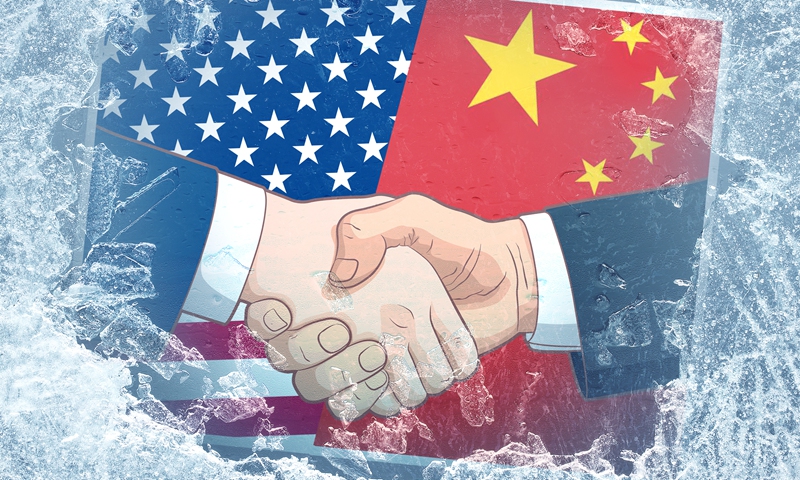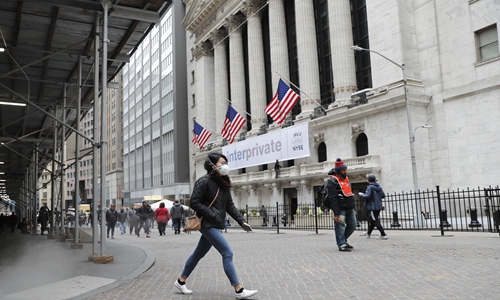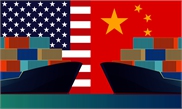
Photo:Global Times
China's Ministry of Commerce (MOFCOM) said on Thursday that Chinese and US officials will hold trade talks in the "coming days," offering urgently needed reassurance, after mixed signals from US officials sparked concerns over the phase one trade agreement, though the US might play political tricks that could undermine the rare channel of communication.
The announcement from Beijing followed days of speculation and mixed signals from the US, which underscored the eagerness and urgency in Washington for engagement with Chinese officials to pursue the hard-fought agreement despite its ill-advised relentless attacks on China from technology to the South China Sea, Chinese experts said.
Chinese officials will likely raise those issues, particularly Washington's intensifying crackdown on Chinese technology companies such as Huawei and TikTok, and call on the US to improve conditions for the implementation of the agreement, the experts noted.
Reassurance
Asked about media reports of possible discussions over the progress of the phase one trade agreement, Gao Feng, a spokesperson for the Chinese Ministry of Commerce (MOFCOM), said that "the two sides have agreed to hold a call in the coming days."
At an online press conference, Gao did not offer further details, including the specific time, the format, the topics and the names of officials who will participate.
Still, the announcement sent a clear signal that both sides are still trying to push forward the phase one agreement, experts noted.
"Indeed, both sides need this dialogue," Bai Ming, a research fellow at the Chinese Academy of International Trade and Economic Cooperation under the MOFCOM, told the Global Times on Thursday, noting that the talks would be focused on making a "serious and pragmatic" review of the implementation of the phase one agreement.
Under the agreement, which was signed in mid-January and took effect in mid-February, senior officials would meet every six months to discuss the progress. Despite hurdles posed by the COVID-19 pandemic and an increasingly hostile US administration, China has been stepping up its purchase of US agricultural and other products.
On July 30, China reportedly made a record single-day purchase of 1.94 million tons of US corn, followed by 195,000 tons on Tuesday. Between August 7 and 14, China bought 2.3 million tons of soybeans, according to Zhang Xiaoping, country director for China at the US Soybean Export Council.
Under the agreement, China has committed to increasing purchases of US agriculture, energy and other products by $200 billion on the 2017 level.
"Given the impact of the pandemic on the global supply chain, what China has done is not bad at all," Bai said, adding that US officials have recognized such progress on different occasions.
As recently as last week, US President Donald Trump said that China was buying "massive" amounts of US soybeans and corn, and "a lot of things." White House economic adviser Larry Kudlow also said last week that the US was "satisfied" with the progress of the deal.

Passengers walk through New York stock exchange in March. Photo: CNSphoto
US eagerness
However, that did not stop Trump from attacking China, including a crackdown on Chinese technology firms, as he seeks to play tough on China for his reelection bid. At a political campaign event on Tuesday, Trump said that he "canceled talks with China."
After his remarks raised questions about the phase one deal, White House officials reportedly clarified that Trump was not talking about the phase one deal, and that Lighthizer "continues to have discussions" with Chinese officials on the agreement.
"Definitely, it was not that Trump doesn't want to hold [the talks]. He really wants it… the Americans have wanted to convene this meeting from the start," Gao Lingyun, an expert at the Chinese Academy of Social Sciences, who follows the trade talks closely, told the Global Times on Thursday.
The deal is particularly important for Trump as he faces a tough battle in his reelection bid amid a devastating COVID-19 pandemic, a struggling economy and widening political and social divisions, experts said.
But to cater to anti-China forces in the US ahead of the election, Trump has also mounted a seemingly all-out campaign against China, and US officials will likely use the confirmed talks to further pressure China, they noted.
"The purpose of the meeting should be to prevent the bilateral ties from deteriorating further. But as the US election nears, it is highly likely that Trump will use China as an [election topic]," Bai said, noting that US officials might want to "make an empty show of strength" at the talks.
China stance
However, China will also likely to stick to its long-standing stance on the phase one agreement and raise various issues with US officials at the meeting, including the US crackdown on Chinese tech companies, Chinese experts said.
"From the Chinese perspective, the US crackdown will definitely be brought up," Wang Jun, an expert at the China Center for International Economic Exchanges in Beijing, told the Global Times on Thursday, adding that both sides should hold "deep discussions" on Huawei, TikTok and the US' so-called Clean Network program.
Since the signing of the deal, the Trump administration has further intensified its crackdown on Chinese companies, seeking to cripple Huawei, and forcing the sale of TikTok to a US company. Experts said such hostility and escalating tensions have undermined the "atmosphere" to carry out the deal.
"Both sides must jointly create conditions and make efforts for the further implementation of the deal. [The US] cannot restrict exports to Chinese companies, while asking China to purchase certain amounts of products," Gao Lingyun said, pointing to the US ban on chip sales to Huawei.
Chinese officials, while reaffirming their commitment to the deal, have also repeatedly called on the US to create favorable conditions for its implementation.
Asked about the US crackdown on TikTok, Gao Feng on Thursday harshly criticized the US for using excuses such as "national security" to restrict and even ban Chinese companies from operating in the US.
"This has no basis in fact and in the law; it hurts the company's legitimate rights and interests, and is against the principles of a market economy. It's not good for China, the US, and the world," Gao Feng said.



